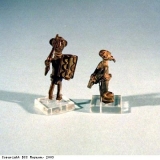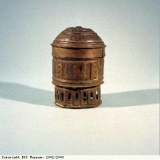Stories of high status Africans
Even wealthy people of high status were kidnapped and sold into slavery. There are several accounts of slavery from people of high status. Their fathers were chiefs or important officials in the chief’s court. Yet they were still enslaved and sold. A few could use their status and influence to gain their freedom. Most of them could not, and they remained as slaves.
Ottobah Cuguano was from Adjumako, today in modern Ghana in West Africa. Cuguano was from an important family in his area. He was kidnapped and enslaved in about 1770. He was sold to a plantation owner on the island of Grenada in the Caribbean. Within the year, he was rescued from ‘this dreadful captivity and horrible slavery’. He was purchased by a new master, Alexander Campbell, and brought to England. He tried to teach himself to read and write, and his owner encouraged this and sent him to school. By 1788 he was free, whether by the gift of his owner or by buying it for himself we do not know. He wrote his autobiography, called Thoughts and Sentiments on the Evil and Wicked Traffic of the Slavery and Commerce of the Human Species, which was published in 1787. Below is a short extract:
“I was born in the city of Agimaque, on the coast of Fantyn; my father was a companion to the chief in that part of the country … [With my friends] we went into the woods [to play] … our troubles began, when several great ruffians came upon us suddenly, and said we had committed a fault against their lord, and we must go and answer for it ourselves before him. Some of us attempted to run away, but pistols and cutlasses were soon introduced, threatening, that if we offered to stir we should all lie dead on the spot …
[in the trading fort ] … I saw [my guide] take a gun, a piece of cloth, and some lead for me, and then he told me that he must now leave me there, and went off”
Job Ben Solomon was the son of Solomon, the Governor and High Priest of Boonda, in Senegal, West Africa. He was sold into slavery and spent two years working in Maryland in America. He was then taken to England. He was set free and returned to Senegal in 1734 when his high status was discovered. His story was written by Thomas Bluett of Maryland. This is probably the earliest slave biography (or slave narrative, as they are called) to be written. In the words of Solomon, Bluett wrote of his capture in West Africa:
“In February 1730 my father heard of an English ship at Gambia River and sent me with two Servants to sell two slaves and to buy Papers and some other Necessaries. He told me not to cross the River and venture into the country of the Mandingoes who are Enemies to my people.
I could not agree terms with this English Captain … so I [decided to] … venture further afield. I crossed the River Gambia and sold the two slaves … When I was resting … a gang of Mandingoes …raided the house … They captured the two of us [Job and his interpreter Loumein Yoai] … they took us to the very Captain Pike I had tried to do business with a few days before!”
The story here is of the local chief, called Tomba. It has been taken from an account written by a European. The story has been rewritten as if Tomba himself was telling his story.
“… I was leader of those villagers by the River Nunes [Sierra Leone] who opposed the slave trade and I led their attack on those who supported the slave traders …. The English trader John Leadstine … sent more men in … to capture me, they succeeded but not before I killed two in their party. Leadstine made me his slave and when the others looked dejected I stayed proud and solemn and would not stretch my limbs out to show the slave traders who inspected us. This angered … Leadstine, who whipped me … and would have killed me, had he not feared losing the money he would gain by selling me. I did not flinch, though I am ashamed to say a tear or two escaped my eye which I tried to hide.”
Abu Bekr es Siddik was a Muslim born in about 1794, in Timbuktu, in Mali, West Africa. He was from an important family, but this did not protect him in time of war, when he was taken as a slave. He was captured and enslaved at the age of about 14, and sold to European slave traders. He was taken to the island of Jamaica in the Caribbean. This was in 1807 or 1808, just before trading in slaves was banned by the British. His knowledge and intelligence was noticed by a magistrate, Dr Madden, who heard his story and asked his owner, a Mr Anderson, to free him. His owner at first refused, because Abu Bekr (known as Edward Donellan) was so valuable to him, being educated and completely trustworthy. Eventually, Anderson did give him his freedom, and he returned to his home country. Abu Bekr es Siddik wrote a short account of his life during a stay in England. In this account he told of his family and the war that led to his enslavement, and 27 years as a slave in Jamaica.
“My name is Abu Beke es Siddik: my birthplace is Tombouctou. I was educated in the town of Djénné and fully instructed in reading and construing the Korán. My father’s name was Kara Músá, the Sheríf [descended from Mohammed], Weteráwí, Tafsír, ie, of the royal family. My mother’s name was Nághódr, that is in the Hausa tongue. She was born in the city of Bornu [of the 17th century Kingdom of Bornu, in modern-day Nigeria] [Abu Bekr decided to visit his father’s grave in the city of Ghonah. A local war between the Sultan of Bondoukou and the Governor of Kolongzhwí, an official of the Sultan of Ghonah, led to the defeat of the Sultan of Ghonah and the sacking of the town] On that day I was made a slave. They tore off my clothes, bound me with ropes, gave me a heavy load to carry, and led me to the town of Bondoukou [now in Ivory Coast ], and from there to the town of Kumasi, the King of Ashanti’s town [now in Ghana]. From thence through Asikuma and Ajumak, in the land of the Fanti, to Daghoh, near the Salt Sea. There they sold me to the Christians, and I was bought by a certain captain of a ship at that town. He sent me to a boat and delivered me to the land of Jamaica. This was the beginning of my slavery until this day. I tasted the bitterness of slavery from them [the Bondoukou, Asante and Fante people] and its oppressiveness.”





